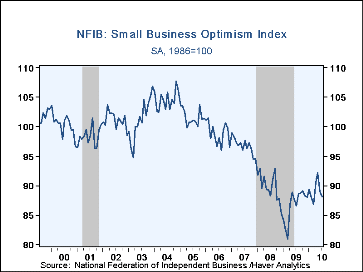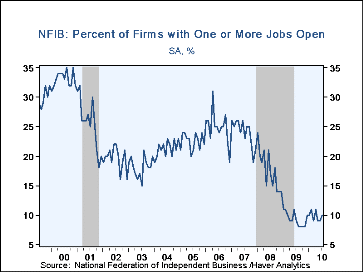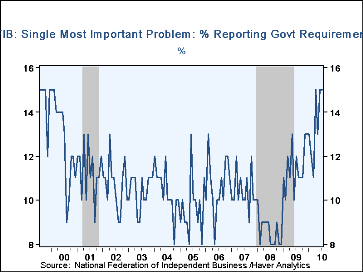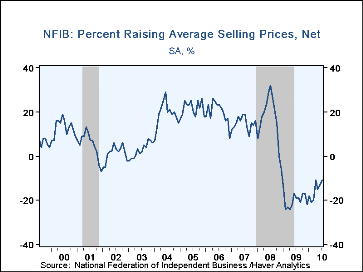 Global| Aug 10 2010
Global| Aug 10 2010U.S. Small Business Optimism Falls Again
by:Tom Moeller
|in:Economy in Brief
Summary
For the second consecutive month, small business optimism fell. The National Federation of Independent Business (NFIB) reported their July small business optimism index fell m/m to 88.1. That's down from the recent high of 92.2 and it [...]
For the second consecutive month, small business optimism fell. The National Federation of Independent Business (NFIB) reported their July small business optimism index fell m/m to 88.1. That's down from the recent high of 92.2 and it has varied around the current level since May of last year. While the latest is improved from the recession low of81.0 in March 2009, it's far lower than its 2004 peak. During the last ten years, there has been an 85% correlation between the level of the NFIB index and the two-quarter change in real GDP.
The percentage of firms expecting the economy to improve deteriorated sharply to a negative 15, the lowest level since March of last year. Expectations for sales in the next six months improved modestly but remained the worst since September while the percentage liquidating inventories fell modestly. Improvement in company earnings this quarter slipped again from the highest level in two years.
Hiring plans remained restrained. The percentage of firms with one or more job openings ticked up to 10%, down slightly from its recent high of 11% and down sharply from 25% before the recession. The percentage of firms planning to increase hiring improved to the highest since September 2008. During the last ten years there has been a 74% correlation between the NFIB employment index and the six-month change in nonfarm payrolls.
Pricing activity improved modestly as the percentage of firms actually raising prices rose to -11% (indicating deflation). During the last ten years there has been a 51% correlation between the six-month change in the producer price index and the level of the NFIB price index. Also, the percentage of firms planning to raise prices reversed most of the improvement during the last two months and fell m/m to 10%. That still remained up from last year's 1% low. Finally, the percentage planning to raise worker compensation improved slightly to 5% versus none at last year's March low.
The most important problems seen by business were poor sales (29%), taxes (21%), government requirements (a sharply increased 15%), insurance cost & availability (8%), competition from large businesses (7%) and inflation (3%).
About 24 million small businesses exist in the United States. Small business creates 80% of all new jobs in America and the NFIB figures can be found in Haver's SURVEYS database.
The statement from today's FOMC meeting can be found here.
Tom Moeller
AuthorMore in Author Profile »Prior to joining Haver Analytics in 2000, Mr. Moeller worked as the Economist at Chancellor Capital Management from 1985 to 1999. There, he developed comprehensive economic forecasts and interpreted economic data for equity and fixed income portfolio managers. Also at Chancellor, Mr. Moeller worked as an equity analyst and was responsible for researching and rating companies in the economically sensitive automobile and housing industries for investment in Chancellor’s equity portfolio. Prior to joining Chancellor, Mr. Moeller was an Economist at Citibank from 1979 to 1984. He also analyzed pricing behavior in the metals industry for the Council on Wage and Price Stability in Washington, D.C. In 1999, Mr. Moeller received the award for most accurate forecast from the Forecasters' Club of New York. From 1990 to 1992 he was President of the New York Association for Business Economists. Mr. Moeller earned an M.B.A. in Finance from Fordham University, where he graduated in 1987. He holds a Bachelor of Arts in Economics from George Washington University.
More Economy in Brief
 Global| Feb 05 2026
Global| Feb 05 2026Charts of the Week: Balanced Policy, Resilient Data and AI Narratives
by:Andrew Cates










